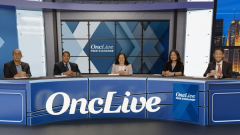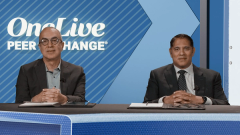
Informing Systemic Therapy Selection With Negative Data in HSPC
A brief conversation on negative clinical trial readouts and how they may help to inform optimal treatment pathways for patients with metastatic hormone-sensitive prostate cancer.
Episodes in this series

Transcript:
Rana McKay, MD:We talked about triple therapy with ADT [androgen deprivation therapy] and ARSI [androgen receptor signaling inhibitor] plus docetaxel. We’ve seen a series of studies of triple therapy with ADT plus ABI [abiraterone; Zytiga] plus an AR [androgen receptor] antagonist, and recently had a publication looking at ABI [abiraterone; Zytiga] and enzalutamide [Xtandi] in the mHSPC [metastatic hormone-sensitive prostate cancer] setting, what’s your take on that?
Arash Rezazadeh Kalebasty, MD:Well, whatever I saw until yesterday talking about the differences in races, all these studies have been negative from way back when we tried to add. AR target is something that you hit and you can go beyond it that’s with 1 agent or 2 agents or 3 agents. [It] doesn’t matter. Three, I haven’t seen. I made it up. But two, it hasn’t been better than one. Whether Dr George’s data pans out in a different setting, I don’t know. But it was an interesting observation.
Sumit K. Subudhi, MD, PhD:The consistency of the failure of combining abiraterone with a second-generation androgen receptor antagonist, it’s been seen in the localized setting, in the castration-resistant setting, and now in the hormone-sensitive setting, so there’s consistency in the failure.
Rana McKay, MD:Absolutely. Even just to bring it in, we saw some data that emerged from one of the cooperative group studies that looked at the combination of abiraterone and enzalutamide with potentially some drug-drug interactions, any thoughts there?
Ulka Vaishampayan, MD:I think there is overwhelming data to not do the combination. I’m not sure it matters whether there is drug interaction or not. I don’t think I would use it.
Sumit K. Subudhi, MD, PhD:I don’t think we’re going to go back and do a study with different doses.
Rana McKay, MD:I hear you.
Sumit K. Subudhi, MD, PhD:Even with the drug-drug interactions, there were toxicities that we’re seeing.
Ulka Vaishampayan, MD:The toxicities are not trivial and the cost and for no benefit.
Arash Rezazadeh Kalebasty, MD:The level of abiraterone was lower in combination, but the toxicity was not solid. Losing efficacy for more toxicity, I don’t think it makes any sense.
Rana McKay, MD:I love that we’ve tested this in multiple contexts. Stop combining ARSIs together. It seems to not really be the right strategy in the localized mHSPC and mCRPC [metastatic castration-resistant prostate cancer].
Transcript edited for clarity.









































